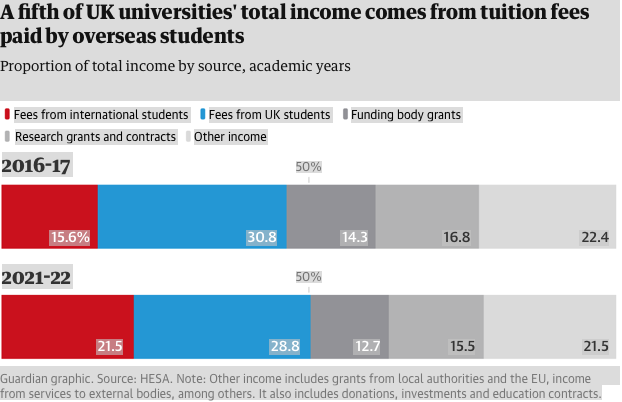
There has been another resurgence of immigration talks in UK politics recently. In these times it is hard to navigate the political narrative and economic facts. Here is a small post that might make the problem easier. Whilst this does encompass a comprehensive analysis across all migration types and their impact, it is an interesting look into one of the largest sections of migration in the UK and therefore holds importance.
Who are the young migrants boosting the economy in the UK?
Other than those granted a visa simply to visit the UK, the majority of those who apply to come to the UK are here to study.
From this group, the UK receives a significant net benefit, not only in monetary terms, but also in more indirect ways. Looking at the figures, a study by UUK, Hepi and London Economics looked at the economic impact of international students in the UK. The study, focused on international students who started higher education in the UK in 2021/22, they estimated that “each of the UK’s 650 parliamentary constituencies is £58m better off as a result of them, equivalent to approximately £560 per citizen”. At an aggregate level, this equates to around £41.8bn. What I personally like about this is that the benefit spreads across the UK, rather than just being London intensive.
But what about the costs?
Accommodating international students of course costs money, when taking into the public costs of international students, including areas such as healthcare, education provided to dependents, and public order to name a few, the costs provided by the group of students focused on in the above-mentioned study, they calculated a cost of around £4.4bn. If we take this away from our figure of £41.8bn, this still leaves a considerable net benefit of £37.4bn.
What are the mechanisms behind this?
To name the most important few;
- Fees – Universities can charge overseas students significantly higher tuition fees. An overseas undergraduate pays on average £22,000 a year (British Council). This not only provides universities with higher funding, allowing for better services and research (a benefit to us all) but also indirectly subsidies the comparatively lower domestic tuition fees which are currently capped at £9,250. This can be seen in Universities such as the Royal College of Art (RCA) and the University of the Arts London, whose tuition fees from EU and non-EU students made up more than half (54%) of total income in 2021-22 (London Economics). On average however, the figures for international students contribution to university income can be seen below:

By subsidising tuition fees for domestic students, more domestic students are able to go to university to earn qualifications and skills. As a result, the domestic UK population becomes higher skilled and qualified. Consequently, productivity and earning potential in the UKs domestic population increases, as productivity in the economy increases, our potential output increases and goods and services become cheaper. This not only results in lower prices for domestic consumers, but also makes our goods/services comparatively cheaper internationally, potentially reducing the deficit on our balance of payments.
- Domestic spending – International students spend in the domestic economy, purchasing goods and services. As a result, businesses earn more money, consequently, firms have more money for higher wages, employment, and investment into research and development. International students also pay for accommodation – Perhaps a reader knows/is a native born brit who derives income from renting properties to students?
- Tax revenue whilst students and/or their dependents work during their studies.
Other benefits:
- Soft diplomatic power/prestige for the UK on the international stage.
- Exchange of ideas and contacts with a more diverse population.
In conclusion, there is a large group in the UK that boosts our economy. They are called international students and taking into account their public costs, provide a significant net economic benefit to the UK. Whilst looking into this topic I was shocked to see how little material there is available, and as a result the number of sources available for me was limited. I hope to contribute to this and provide more information in the future.